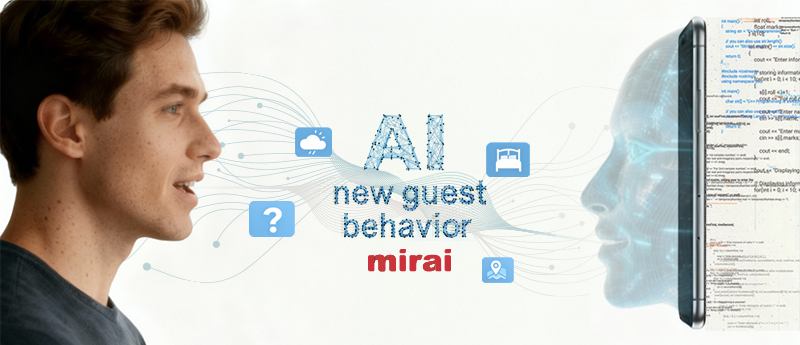En español, en français, em português.
Think about your own habits: the way you search for information and get answers has already transformed. Artificial Intelligence (AI) is reshaping user behavior at lightning speed. Ignoring this shift is risky. Yet most hotels still serve these new users the old way: with a conventional website — mostly informative and experiential — and a phone number.
That’s no longer enough. Hotels must adapt fast before it’s too late.

But first, let’s break down how this transformation is redefining guest expectations:
How guest behavior is changing with AI
- Immediacy. We’re getting more impatient than ever and expect direct answers rather than finding them ourselves. Hotel websites must be able to deliver clear responses instantly, without expecting visitors to browse endless pages.
- Conversational. Guests will expect to interact with you the same way they do with ChatGPT or Gemini: in a fully natural, conversational manner.
- Understanding and reasoning. When talking, we want to be understood the first time, without being asked to rephrase or explain again. Hotels must adapt to guests, not the other way around.
- Multilingual. Speaking only one or two languages is no longer enough. Guests expect seamless multilingual communication, regardless of their origin.
- Voice. Voice messaging — once just a WhatsApp feature — is rapidly becoming a new standard, accelerated by AI tools like ChatGPT and the widespread use of microphone buttons on mobile devices. While adoption is uneven, for many users speaking feels far more natural than typing, especially in the exploratory stage of a conversation. Hotels must be prepared for this shift.
- Context. Traditional chatbots fail because their lack of memory prevents them from delivering consistent, high-quality responses. True AI agents keep track of past questions, preferences and context. Once guests experience this, there’s no going back.
- Messaging interfaces. Many guests—especially younger generations—will bypass your website and head straight to WhatsApp, Instagram or AI-powered assistants if you make those channels available. The website remains vital for branding and transactions, but on its own it is no longer enough.
- Personalization. Who does not like to get personalized answers? Consumers in general want providers to recognize their preferences, past behavior, and intent, without asking them to repeat themselves.
- Proactivity. Guests don’t just want answers when they ask, they expect you to anticipate their needs and proactively offer solutions, just like a digital concierge.
- Trust & transparency. Guests demand accuracy and reliability. They will only trust AI if it provides clear, up-to-date and transparent information. Any mistake or generic response breaks confidence instantly.
AI agents to the rescue
Conventional chatbots have been around for years, but they rarely solved real guest problems. Based on keywords, most failed to understand conversations or keep context. Overall, satisfaction was consistently low. Much of the challenge was on the hotel side: with so many competing priorities, hoteliers often lacked the time and resources to properly feed these platforms with accurate information, which ultimately limited their effectiveness and worsened the experience.
That era is ending. Ironically, the same AI that disrupted guest behavior is now enabling the very technology that will serve today’s transformed guests. This new generation of AI-driven agents will allow hotels to stay open 24/7 across multiple touchpoints—WhatsApp, Telegram, Instagram and beyond—delivering high-quality automated service. However, they will face the same Achilles’ heel: the hotelier must feed the model with accurate information. The good news is that modern AI makes this process far easier, allowing hoteliers to provide content in natural language — even through voice messages — without the need for complex configurations.
Redefining the scope of hotel websites
At the same time, websites must evolve from static brochures into intelligent, AI-powered assistants. That means serving content in much deeper detail than traditional websites and becoming true online concierges with full knowledge about the hotel, its services, facilities and experiences around it. Hotels should be ready to provide a dual model: one for traditional readers (still a lot) and another for the growing number of immediate-response seekers.
In other words, your website must stop being a static brochure and become a living, intelligent concierge.
The role of service providers
Who’s better positioned to serve hotels in this new fast-changing environment? Certainly, legacy systems—website & CMS providers, traditional chatbots, and even booking engines—may struggle to adapt. Only those that invest to rebuild with native AI, or are born from scratch, will have a real chance. A fascinating new race is underway and the pace of change and announcements will be breathtaking.
Conclusion
This is the new reality and it will keep evolving as we speak. The dimension of time with AI has shrunk to weeks or months. Expect rapid evolution over the coming years until technology matures. But the time is now. Hotels must question their solutions and make bold moves because time flies, and AI won’t wait for anyone.
The question is not whether AI will reshape guest behavior, but whether your hotel will be ready when it does.
Disclaimer. At Mirai we’re working on native AI-powered websites and agents, as we truly believe hotels must embrace this shift. Still, the ideas above apply regardless of provider.




